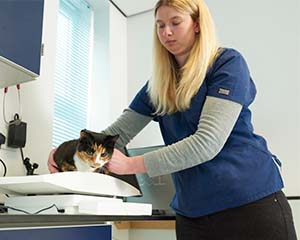28 September 2018
Senior figures representing large veterinary employers and independent practices across the UK have joined forces to come up with solutions to address recruitment and retention issues and other current challenges facing the workforce.
Chief Executives and directors from the UK's largest corporate employers and a large community of independent practices explored issues and possible solutions at a round table event convened by the British Veterinary Association (BVA). They were joined by representatives from the Society for Practising Veterinary Surgeons (SPVS), regulatory body the Royal College of Veterinary Surgeons (RCVS) and the British Veterinary Nursing Association (BVNA).
Veterinary roundtable summary report (240KB PDF)
Many attendees reported shortages and struggles to fill vacancies within practices. All around the table lent their support to BVA's call for the Home Office to reinstate vets on the Shortage Occupation List as a matter of urgency to avoid a looming crisis in capacity.
A key theme in the discussion was how to help “Brand Vet” attract a diverse range of suitable graduates, while ensuring that expectations for a challenging and rewarding career are both met and managed. Many around the table questioned whether university selection criteria prioritise academic excellence too much over vocational desire, and underlined the importance of employers offering students high quality extramural studies to help equip them for the realities of working life in practices.
Discussions turned to changing ways of working and how to support wellbeing in the workplace. Attendees reported that stress and long hours were still widespread, and the need to provide services out of hours was singled out as being particularly problematic in small or remote practices. However, many were also seeing incoming staff asking for more flexibility in working hours or moving into locum work in pursuit of a better work-life balance.
As well as continuing a coordinated drive for vets to be reinstated on the Shortage Occupation List, BVA is keeping in close contact with the attendees and taking forward several key actions. These include setting up a meeting between employers and university deans to discuss graduate support and how to facilitate a smooth transition into the workplace, and further work to explore the role of vet nurses and other allied professionals.
Gudrun Ravetz chaired the round table as BVA Senior Vice President in July. She said: “Attendees at the event represented a significant proportion of the veterinary market, and it was really encouraging to see that we are all united in recognising that bold solutions are needed to avert a recruitment crisis while ensuring those already working in practices continue to feel both fulfilled and valued.
“A veterinary career is a challenging and rewarding one, but we have to look at the reasons why people shy away from entering the profession or choose to leave it and tackle those head on. To do that, we need to understand and align with people's expectations but also ensure that graduates are well equipped to acclimatise and thrive in the workplace.
BVA is tackling some of these questions with its collaborative research with Professor Michelle Ryan of Exeter University but this roundtable is an important step in widening our understanding and looking for solutions.”



